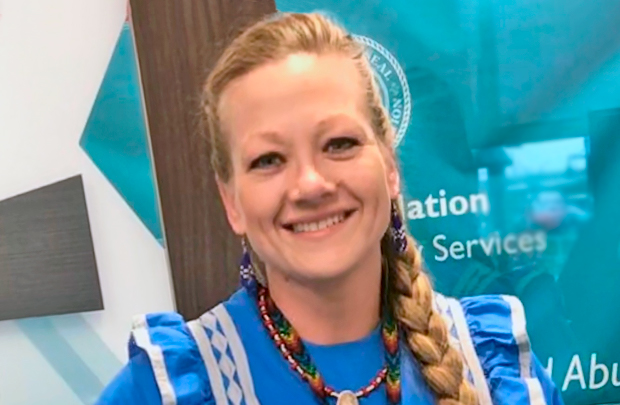
Amber Scott is a social worker with the Choctaw Nation of Oklahoma. A colleague suggested that we feature her as an Outstanding Caseworker, writing:
“Amber works tirelessly every single day to fight for the children on her caseload. She oversees out-of-state Indian Child Welfare cases in 12 states, including California and Washington… She voluntarily takes on more than her job requires to make sure her families are getting the best she can give. Amber is selfless, honest, and kind. She is a living breathing model of the Chahta values of faith, family, and culture and an asset to the Choctaw Nation.”
For people who might not know, briefly, what is the Indian Child Welfare Act?
The Indian Child Welfare Act (ICWA) was created to help prevent Native children from being removed from their birth families and being placed in non-Native homes. The law has been in existence since 1978, when the federal government acknowledged that a very high percentage of Native families—as much as one-third at some points in history—had been broken up. Children were being placed with white families and losing touch with their culture.
What is your role?
My job is to make sure that ICWA standards are being applied when Choctaw children are in state custody. Once a child is determined to be a member of our tribe, I become a party to their case and participate in all legal proceedings involving that child and their family.
I’m one of three social workers who handle out-of-state cases. Right now I’m working on about 70 cases.
What does it mean to ensure that ICWA standards are applied?
Even though ICWA has been around for more than 40 years, there is still a lot of confusion surrounding it. So part of my job is educating people about ICWA and about Native child-rearing practices. The other part is ensuring that courts and workers follow the rules so that birth families receive the support they need to make reunification with their children possible.
People of often say that ICWA is the gold standard in child welfare. That’s because it requires—among other things—that systems make what are called active efforts to reunify a family. This means going a step beyond the reasonable efforts that every state system is required to make and offering intensive services to keep a family together.
For example, recently I worked with a mom who was seriously at risk of losing custody of her three children. The kids were living in three different foster homes, each about an hour apart—and an hour away from her home. For whatever reason, the mom’s visitations with them had all been scheduled on the same day! And her parenting classes took place that same evening. So the mom was cutting her visits short, and had missed some of her classes. That meant she wasn’t meeting the requirements to get her kids back.
I was able to intervene and help reschedule those visits and classes, and also help her get special accommodations made that addressed a diagnosed learning disability. Helping reschedule those meetings and ensuring special accommodations are an examples of what active efforts look like.
What do you like most about your work? What have been the biggest rewards?
I like being that voice for our tribal members and keeping families together. In the case I talked about earlier, that mother got her kids back. I’ve stayed in touch with her—and I’ve heard from both her and one of the foster parents that the family is doing great! I can’t help but wonder if those three kids would be living with their mom if she wasn’t a member of our tribe, and if I hadn’t been a party to that case.
The colleague who wrote to us praised your extraordinary efforts to do more than your job requires. What motivates you?
Well… I guess I’m more than a little bit passionate about the work. This isn’t just a job to me. I put myself in these families’ position and try to advocate for them as much as possible. Because it’s important to keep our families together, to educate them about tribal culture, and to let them know that there is assistance through the tribe. Because many of our families struggle, and they need that support.
What have been the biggest things you’ve learned doing this work?
I grew up in the Choctaw tribe, but I wasn’t raised practicing the culture. In this job, I’ve learned a lot about our culture, because I have to know it for my job. We have things like monthly Heritage Day celebrations and we take classes about things like beading, weaving, and making dolls with reed. I hate that I missed out on that all these years, but now, I’m able to share our culture with my daughter, who’s now an adult, and maybe with grandkids one day.
Read about things to consider when fostering or adopting Native children on our website.